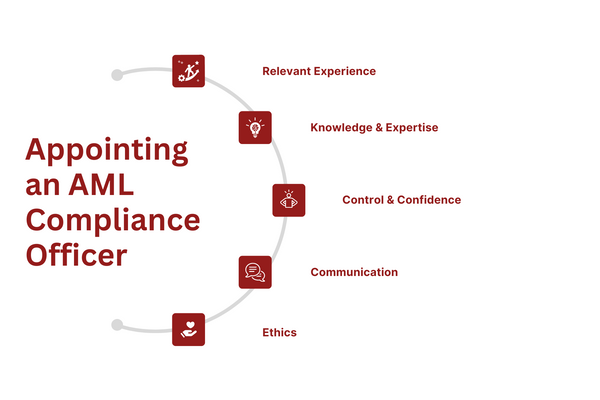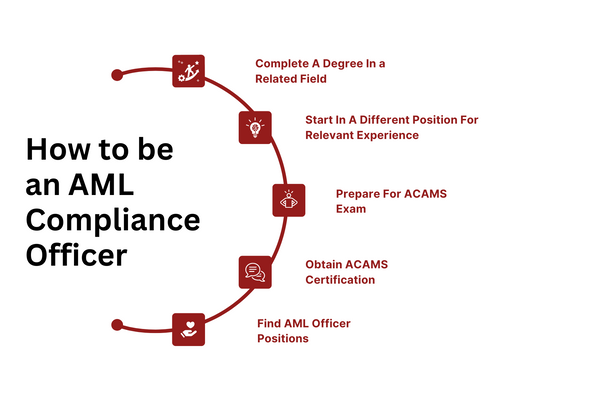
Money laundering and financial fraud are serious crimes that businesses must avoid. The role of an AML compliance officer is crucial for any business at risk for money laundering to ensure compliance with AML compliance frameworks.
The AML compliance officer is an important position for companies that deal with a lot of money. This article will cover the role of an AML compliance officer, what their job entails, and how to become or hire an officer yourself.
Let’s get started.
What is an AML Compliance Officer?
AML stands for anti-money laundering. Money laundering is a serious financial crime businesses want to avoid at all costs. Businesses that deal with a lot of money are typically required to appoint an AML compliance officer to prevent money laundering and maintain adherence to AML regulations and laws.
The AML compliance officer ensures a business’s continued corporate compliance with money laundering regulations. They also find and prevent fraudulent financial activities within the business.
The penalties for not adhering to these regulations are severe and demonstrate the importance of the AML compliance officer’s role.
What is the Role of an AML Compliance Officer
What is an AML Compliance Officer.png

The importance of the AML compliance officer’s role can not be overstated. They are responsible for ensuring financial compliance with the AML compliance framework. Some of their main responsibilities include:
Creating and implementing a set of AML programs and protocols that adhere to the framework of AML regulations and create a businesswide standard of AML compliance
Maintaining client records to monitor and observe any suspicious activity and being ready to report if necessary
Creating a risk framework to assess the business’s risk areas and devise ways to reduce AML risks or threats
Staying on top of all new and existing AML regulations and laws to ensure their business’s continued compliance
Enlisting auditors and third parties to conduct regular inspections of the business’s operations and AML procedures to check for errors and adjust accordingly
Creating a training program for new employees and overseeing/implementing a continuous training program for existing employees
Compliance officers create the business’s compliance protocols and procedures, but their responsibilities don’t end there.
AML compliance officers must monitor consumer transactions and employees and screen for potential risks continuously. These responsibilities are necessary for a business to maintain compliance with AML regulations.
AML Compliance Officer Job Description
The AML compliance officer has a lot of responsibilities and will require some experience with AML regulations and implementing training programs.
No special training or field of study prepares somebody to become an AML compliance officer, so an ideal candidate can come from almost any field.
Here are the skills, duties, and requirements you’ll often find in AML compliance officer job descriptions:
Skills:
Well-versed in reading and interpreting government documents
Maintaining confidentiality
Clear communication
Reading data
Interpreting risks accurately
Management
Corporate training
Duties/Responsibilities:
Monitoring and evaluating compliance with AML regulations/laws in the jurisdiction of operation
Developing, documenting, and maintaining a comprehensive compliance policy to support AML objectives
Overseeing customer due diligence and risk profiling procedures across all activities in the organization
Coordinating with internal and external stakeholders to ensure complete compliance with AML programs, protocols, and procedures
Identifying any unusual or suspicious behavior in customer transactions that should be reported to the relevant authorities
Setting up systems for testing of customer due diligence processes and AML internal controls
Ensuring other staff members have the correct knowledge to complete any relevant duties related to compliance with Anti-Money Laundering regulations
Coordinating with senior management, like the chief compliance officer, on quarterly/annual reporting requirements
Maintaining relationships with regulators and overseeing enforcement activity
Requirements:
Hold a degree in a financial field such as accounting, finance, or law
Previous experience in a financial institution of some kind in a management role or a position that dealt closely with internal operations (preferably compliance-related)
ACAMS certification preferred
Accounting certifications (CFA) or previous experience handling financial records of a business.
Management experience involving training and communicating with all levels and positions of a business or similar experience in a role that involved training.
Experience with compliance solutions and risk software and utilizing it to create/optimize a business’s compliance in its operations.
Experience with auditing processes and requirements
A business will favor any candidate with a financial or legal background. This will ensure the candidate can comprehend financial regulations and operations such as accounting and record keeping.
Other candidates with experience creating or implementing training programs are also highly desired. Understanding the AML frameworks is only half the job for an AML compliance officer. The most important aspect of the role is to implement the regulations successfully and ensure continued compliance through programs and protocols.
Appointing an AML Compliance Officer
Appointing an AML Compliance Officer.png

In some cases, certain regulations may require you to appoint an AML compliance officer. In many cases, it won’t be required, but it could save you many headaches.
Either way, hiring an officer should be a top priority to properly navigate AML regulations. Here is what to look for when you appoint an AML compliance officer:
Relevant Experience
One of the most important things to look for in an AML compliance officer is experience.
Any experience relating to AML regulations and practices, implementing/complying with them, assessing and preventing money laundering threats, and handling a financial institution’s records with confidentiality is useful.
Current experience with AML regulations is valuable. The candidate will know some of the requirements for your business to navigate.
Other relevant experience can include management or accounting. The AML compliance officer must be able to train and implement protocols for your business to follow.
Knowledge & Expertise
The next thing to look for is knowledge and expertise in AML policies. A degree in the financial field will ensure your candidate has a good base knowledge of financial practices and regulations.
A certification like the ACAMS will demonstrate a candidate’s expertise in current AML practices and is a great indicator of preparedness for the role.
A candidate’s knowledge can also come from experience. If they were in a role where they had to manage risk strategies and prevention methods, they could easily apply the experience to the AML officer role.
Control & Confidence
With the appropriate knowledge of AML policies, a candidate must also be able to implement them into your business successfully.
For this to happen, a candidate should be able to confidently lead other employees in training and following AML policies and procedures.
Previous experience in management can be a good indicator of a candidate’s ability to lead other employees. Previous roles that show good experience include risk management or policy management in a financial institution.
Communication
A successful candidate must have excellent communication skills to guide other employees and implement AML procedures. They must accurately communicate AML policies through all levels of a business to ensure compliance.
An AML compliance officer must be able to communicate with and lead all employees. This requires stellar communication skills.
Be on the lookout for relevant experience working with different departments in an experience to gauge their communication skills.
Ethics
With the power that an AML compliance officer will hold, you want to ensure they also have strong ethics.
Standing against money laundering and other financial crimes requires strong resolve and unbreakable ethics. Your ideal AML compliance officer will take a strong stance against these crimes and seek to root out any trace from your business.
A good AML compliance officer’s ethics should also extend to their leadership and management while enforcing AML policies.
If they abuse their power for their own financial gain or even treat others poorly, that will put you and your business in a bad position.
How to be an AML Compliance Officer
How to be an AML Compliance Officer.png

If you want to become an AML compliance officer, there are some steps you can take to greatly increase your chances of becoming one. Here are some steps to become an AML compliance officer:
1. Complete A Degree In a Related Field
Earning a degree in a financial field such as accounting, finance, economics, or business is a great first step.
This degree will give you a foundational knowledge of businesses’ financial operations and practices. It will also introduce you to money laundering and fraud and the importance of preventing these crimes.
A degree in a financial field is not the only way to become an AML compliance officer, but it is beneficial.
The degree will show employers the knowledge you already have of financial practices and your certified educational background. A degree will also count towards credits for the ACAMS exam.
2. Start In A Different Position For Relevant Experience
After obtaining a degree, getting the relevant experience you can utilize later on as an AML officer is always good. Most officer positions will require experience, so any work you can find at a financial institution, such as a bank, is valuable.
You can use your experience to show employers your preparedness to be an AML compliance officer. If you cannot obtain a degree, relevant experience in a financial role is a great substitute, and employers might even see it as more valuable.
3. Prepare For ACAMS Exam
There is no better certification than completing the ACAMS or Certified Anti-Money Laundering Specialist exam to prepare yourself for the role of an AML compliance officer. This certification is universally recognized and displays your knowledge of anti-money laundering strategies.
To take the exam, you must be an ACAMS member and have 40 credits with the organization.
ACAMS will give you credits based on your anti-money laundering experience. For example, an associate’s degree is worth 10 credits, a bachelor’s is worth 20, and a master’s is worth 30.
Relevant experience can also net you credits with ACAMS if you do not have a degree. You can also earn credits directly through ACAMS by attending webinars that they provide.
After obtaining all the required credits, you can use ACAMS study guides to create a study schedule and prepare for the exam.
4. Obtain ACAMS Certification
The ACAMS exam can be difficult and will require many weeks of studying. While this certification is not absolutely necessary to become an AML compliance officer, it will show your expertise and preparedness to employers.
The exam is available in multiple languages and will cover various topics related to anti-money laundering policies and principles.
Obtaining the certification is a big time commitment and will not be easy, but it will greatly increase your chances of being selected for an AML officer position.
5. Find AML Officer Positions
After completing the ACAMS certification, or relevant experience, it is time to find AML compliance officer positions and start applying. You can find open positions in financial institutions or businesses’ financial departments.
With your relevant experience, background in finance, and ACAMS certification, you are a top pick for the AML compliance officer role. Even without all these prerequisites, you can start at other positions in the same business and gain valuable experience to apply later.
FAQs
What Does An AML Compliance Officer Do?
An AML compliance officer ensures a business’s continued compliance with anti-money laundering and financial fraud regulations. They will stay current on all AML regulations and laws and successfully implement programs and protocols for a business to follow.
Is AML Compliance Officer A Good Job?
The role of AML compliance officer and other AML-related jobs are in demand following an uptick in AML regulations for businesses. Knowledge and experience in AML practices are valuable skills that can land you a good position in a financial institution.
How Do You Succeed As An AML Compliance Officer?
To succeed as an AML compliance officer, you must demonstrate a deep understanding of AML regulations and implement them successfully into the business. You have to communicate and work effectively with all levels of the business to ensure compliance across all departments.
How Much Do AML Compliance Officers Make?
An AML compliance officer’s salary will vary depending on location, knowledge, and experience but can range anywhere from $50,000-$160,000.
What Is The Best Degree For An AML Compliance Officer?
The best degree for an AML compliance officer will be related to financial practices. Relevant degrees include accounting, finance, economics, financial law, and business risk management.
Closing
With increasingly stringent financial regulations, ensuring AML compliance is more important than ever. The importance of an AML compliance officer can not be overstated; some governments even require the role of certain businesses to ensure AML compliance.
Money laundering is a serious crime and can lead to devastating outcomes if not contained. AML compliance officers play an increasingly important role in today’s financial world, and your business should prioritize preventing financial crimes at all costs.